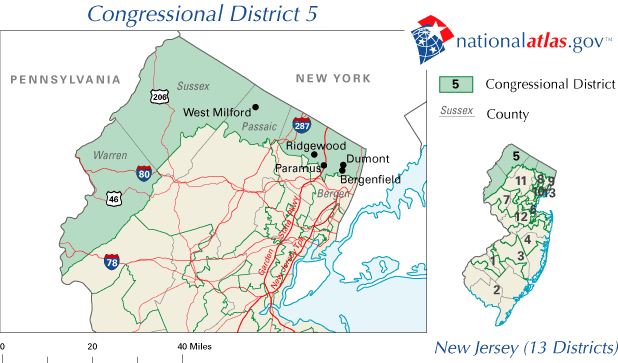NJ-05
NJ-05 race summary:
Incumbent: Josh Gottheimer (D), since 2016
Challenger: John McCann (R)
2016 swing: +8.26 (R to D)
Population: 647,258 (153,803 registered Democrats, 150,788 registered Republicans)
Cook PVI: R+3
New Jersey’s Fifth District hugs the northern portions of Warren, Sussex, Bergen, and Passaic Counties and is arguably one of the more rural districts in the state. The district’s eastern parts tend to have a fairly liberal voting record, while the more rural western parts of Warren and Sussex Counties are more conservative [1]. Similarly, the same could be said for the income distribution across the district, with its eastern portion boasting some of the highest incomes in the nation while voters in the west of the district are characterized by lower incomes and a slightly lower percentage of high school graduates [1].
Between 1932 and 2016, the district had not elected a single Democrat to the House; in presidential elections, leads upwards of six percentage points for Republican candidates were not uncommon [2]. But with a Cook Partisan Voting Index of only R+3, the district seems unusually well disposed to the Republican Party, especially when compared to similarly Republican districts in New Jersey [3]. However, the demographics of the district, one of the most rural and whitest in the state, would suggest that it would be very much inclined to produce conservative representatives, possibly in the mold of Trump [4]. Indeed, with the exception of a heavily Democratic fragment of the electorate in Bergen and Passaic Counties, everything about the district would suggest that it is fertile ground for Republicans.
Yet in 2016, first-time candidate and former Clinton speechwriter Josh Gottheimer defeated Republican incumbent Scott Garrett [5]. Through a concerted attack on Garrett’s fierce conservatism (Garrett was a founding member of the Freedom Caucus) and alleged opposition to same-sex marriage, Gottheimer was able to clinch the seat, albeit by a lead of four points [6].
Since his election, Gottheimer has branded himself as a social liberal with a fiscal conservative and is one of the most conservative Democrats in the House [6]. His campaign has emphasized protecting Social Security and Medicaid as well as increasing funding for infrastructure improvements [7]. While he has reiterated his commitment to reducing taxes, he is vehemently opposed to last year’s Republican tax plan due to its plan to roll back state and local tax (SALT) deductions [7]. Gottheimer’s Republican challenger, attorney John McCann, also takes exception to the elimination of SALT deductions, although his rhetoric on the whole has been much more pointed [8]. His campaign platform critiques a variety of social and economic issues through a decidedly conservative stance, and, at times, echoes some of the sentiments of the Trump administration.
Looking at the polls, it appears as though Gottheimer has a slight lead over McCann leading up to Election Day, with major ratings listing Gottheimer’s seat as either likely Democratic or safely Democratic [9][10][11]. Furthermore, Gottheimer has outraised his opponent almost tenfold [12]. This sudden increase was partially brought about by a McCann-commissioned poll in August that showed a three point lead for McCann [13]. However, an October poll (also commissioned by McCann) concedes that Gottheimer currently has a nine point lead, though it maintains that the race is still competitive [13]. The Republican Party is similarly optimistic, and has listed the district as a 2018 offensive target since July [14]. However, winning a district where there is a similar amount of registered Democrats and Republicans depends on courting independent voters. At present, it might appear as though Gottheimer’s Blue Dog rhetoric is better suited to this task, and so it would stand to reason that Gottheimer will continue to hold his seat after Tuesday’s election [15].
-Brian Li

